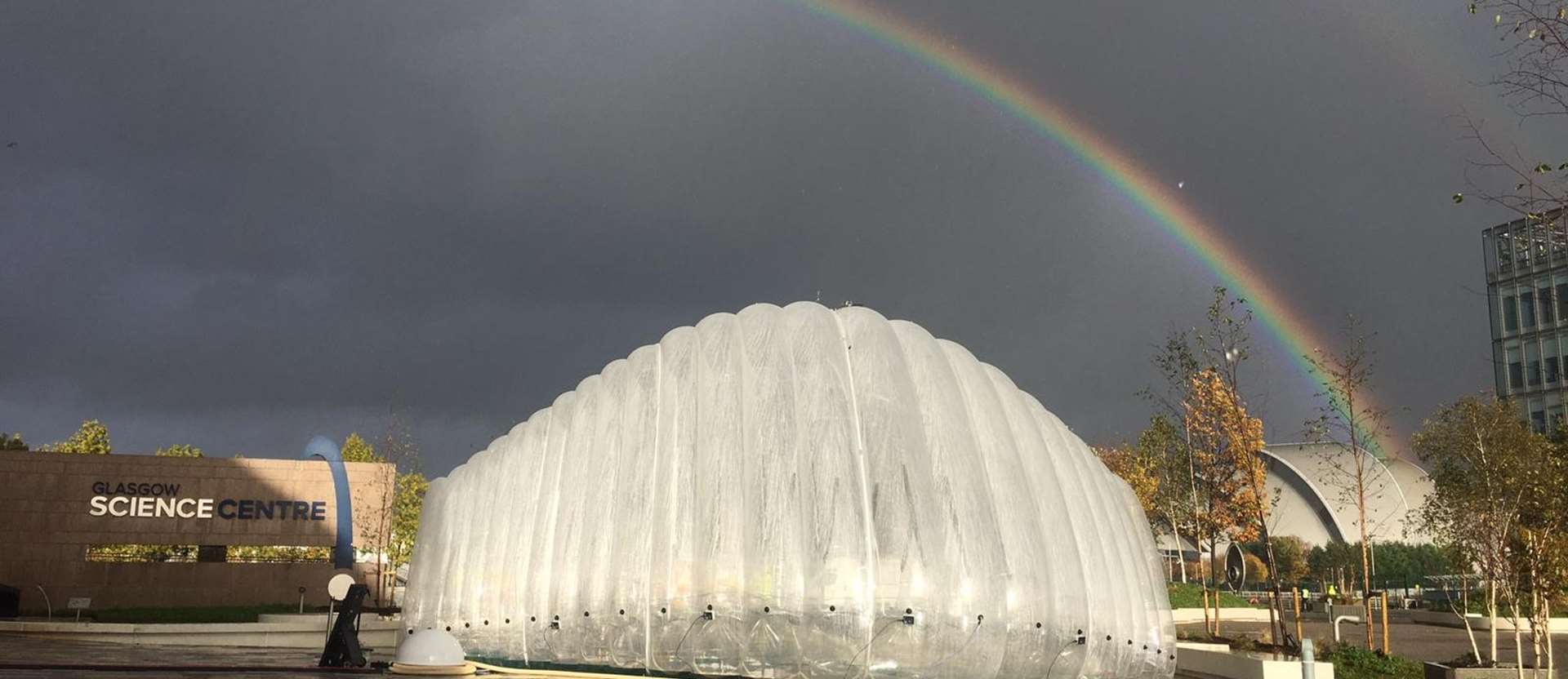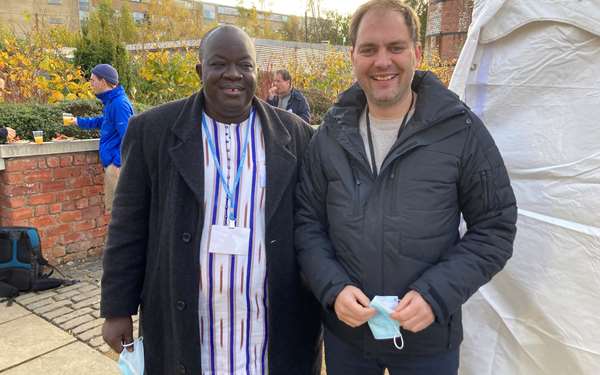
I was a COP26 delegate Here are my thoughts
My Reflections
A week on from the closing scenes of COP26, Tree Aid Director of Operations Georges Bazongo reflects on his experiences in Glasgow and the anticipated impact of proposals and initiatives announced there.
The dust has settled on COP26 in Glasgow. Between the talk and the politics, I was pleased to see significant declarations made to help the people directly affected by and leading the way in the fight against climate change.
However, elements of the conference and the lack of clarity around how African communities on the front line of the climate crisis can access key funds, raises concerns about the seriousness of these declarations.
At times I found myself exasperated at the de-facto barriers delegates from Africa face. I saw oversights as simple as a lack of multilingual signage, which made even navigating the COP spaces a challenge in-and-of itself for non-English speakers.
But I also experienced energising meetings with long-time collaborators and new allies in the spaces of nature-based-solutions to the climate crisis. These gave me hope, and left me feeling positive about what we can achieve moving forward.
Why did I attend COP26?
As a representative of Tree Aid and a Burkina Faso national delegate I went to COP26 to represent the people of Sahel region of Africa. The Sahel region is amongst the lowest contributors to rising carbon emissions, yet we feel the biggest impact. Temperatures have already risen to twice the global average.
Making sure local Sahelian communities are at the centre of the climate fight is an important part of Tree Aid’s mission, so I arrived at COP with clear asks for global leaders.
What will I tell my family when I return home?
When I return to Burkina Faso to see my family and the communities I represented at COP, I will be proud to tell them that their voices, our voices, have been heard by all the parties in the negotiations.
I will, however, also need to express my frustration that there is still a long way to go in overcoming the barriers that prevent Africa’s voice being heard on an equal footing.
What went well?
It was a real pleasure to be able to meet inspiring people who are themselves working for our goals of furthering nature-based-solutions, such as Pieter van Midwood, Chief Tree-Planting Officer at Ecosia. Tree Aid’s partnership with Ecosia goes back to 2015 and I enjoyed the opportunity to meet Pieter in person after all this time.

I was honoured to present Tree Aid’s programme work, learnings and impact analysis at two separate events. Firstly, to Blue Zone delegates at an event on Nature Based Solutions organised by the IIED. This was an opportunity to speak for our communities in the heart of the conference, representing encouraging signs of progress.
Secondly, I presented at a Global Landscapes Forum event on ‘Climate: Forests, Food, Finance – Frontiers of Change’.
Tree Aid also saw some major policy announcements with relevance to our work, and we welcome the following victories:
- Nature was recognised as a crucial solution for climate action, alongside deep emission cuts. Through the decision text (Glasgow Climate Pact), the Glasgow Leader’s declaration on Forest and Land use, and the Global Forest finance pledge. Protecting and restoring nature was rightfully recognised as crucial to reach the 1.5C goal.
- Increased climate finance for adaptation. In the decision text, the proportion of climate finance going to adaptation has been doubled.
- $2 Billion was pledged by world leaders to support the restoration of 100 million hectares of land in Africa. This could see scale-up funding for nature-based solutions in the drylands of Africa, especially the Great Green Wall. This is a fantastic policy that we hope will be very effective. We also saw the Bezos Foundation announce $1 Billion for the Great Green Wall initiative, another welcome donation that will assist this decade of restoration. There was lots of interest from major corporations in what they can do within the drylands, particularly in terms of carbon offsetting.
For the communities I work with in the drylands of Africa, soaring temperatures are having extreme effects on our natural environment, with devastating consequences for the people who depend on it and so these declarations from global leaders are welcomed.
But... the important part comes next; these announcements must become realities in the field. Funding and assisting the work of proven organisations and NGOs on the ground alongside communities, such as Tree Aid is paramount. Funding must not get lost in bureaucracy and administration. The impact is evident, we just need funding to scale our operations.

"The impact is evident, we just need funding to scale our operations."
Boulis construction, La Toden, Burkina Faso
Where COP fell short and what it can learn
Unfortunately, COP highlighted the issues Africa faces making itself heard on the international stage.
For many African delegates, the travel, accommodation and meeting rooms at events such as COP simply aren’t affordable. Many countries from Africa were not able to hire a meeting room, because when we checked, the costs were too high. In Africa, out of 53 countries, maybe a maximum of 10 or 12 countries were able to access these rooms! The economic realities of African nations must be considered in future to ensure equal participation.
I am sad to say, that this reflects the difficulties African communities have experienced accessing funding promised at events such as COP. The mechanisms are simply too complicated and costly for many developing countries.
A heightened focus on tree planting also raises several concerns. An over-emphasis on planting new trees over forest conservation could distract attention from the urgent need to reduce emissions and to protect and restore existing ecosystems. Furthermore, policies which take land used for producing food and transform it for purely for carbon-removal purposes can threaten food security. Reforestation has lower risks of exacerbating hunger, provided it is led by and for the local communities to protect their land and their livelihoods.
Lessons for COP27 in Egypt 2022
In 2022, COP will be held on African soil, in Egypt. In Glasgow, Egyptian delegates told me of their plan to make COP27 a COP for Africa. I’m sure that, in contrast to the UK, Egypt’s leadership will make sure that the language is accessible by all countries in Africa.
In Africa we speak French, English, Spanish, Portuguese... but why not some local languages which are spoken by many African nations? For example, we have Swahili and we have Pular in West Africa. Why not involve all the communities living in dryland Africa and help them to be heard?
It is time for African countries to come together as one voice, ensuring strong participation at COP27. We want to see real influence during negotiations on key projects like the Great Green Wall. It is imperative these are African-led programmes.
At such a significant moment for Africa, COP27 must be inclusive of the entire continent. We will continue to ask for formal recognition of the Sahel as a priority area for the deployment of climate finance and action. And we will continue to push for African leadership, and African voices to drive the solutions.
Donate to our Root for Change appeal this Christmas to build resilience to the effects of the climate crisis and grow the roots for a better, greener future.
Main Image Credit: Leo Plunkett






